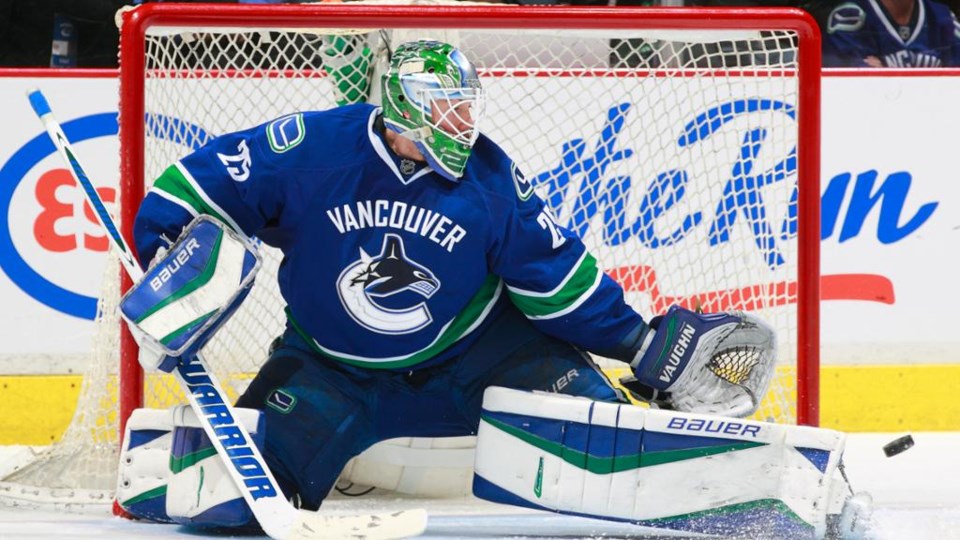“Jacob Markstrom’s going to be our number one goalie going forward,” said Jim Benning, at the NHL Draft Combine on Tuesday, in response to a question about Ryan Miller's future.
On Wednesday, he clarified to Ben Kuzma that what he actuallyĚýmeant was that Markstrom would “” be the number one goaltender. “We’ve been grooming him to be, at some point, our number one goalie,” . “I don’t know when that happens, but that’s our goal.”
The phrase “going forward” appears to be the cause of the confusion. The phrase “going forward” is a particularly useless piece of corporate speak that has infected the NHL over the past few years, suggesting ˛ął¦łŮľ±´Ç˛ÔĚýand motionĚýwithout actually committing to acting or moving.
In common usage, “going forward” simply means “from now on” or “starting now.” Because of this, most people heard Benning say, “From this point on, Jacob Markstrom will be our number one goalie” when he spoke with LeBrun.
Instead, Benning seems to think of the phrase “going forward” as meaning “sometime in the future.” In other words, what he meant was that the Canucks would continue to progress towards the goal of Markstrom becoming a number one goaltender. Someday. Not now. But eventually.
Here’s the problem: if Markstrom doesn’t take the reins as the number one goaltender this season, it likely will never happen at all.
There are a few reasons for that, but one of the biggest is his age. Markstrom is already 27 and will turn 28 next season. While every goaltender is different, on average they tend to peak at around 26 and decline afterwards.
You can certainly point to counter-examples — Dominik Hasek, Roberto Luongo, Johnny Bower, Jacques Plante — but focussing on those particularly exceptional exceptions puts you at risk of survivorship bias. For every goaltender that excels past the age of 30, there are scores more whose play drops off and they end up as backups or wash out of the NHL.
Markstrom turned 26 during the 2015-16 season, which also happened to be his best in terms of save percentage, posting a .915 save percentage in 33 games, matching the NHL average that season. That may not sound like much, but if a goaltender can put up a league-average save percentage over 60 games, I would consider them a number one goaltender.
But that is another issue: Markstrom has never played more than 33 games in a single NHL season. We have no idea how he’ll respond to starting 60 games and the Canucks missed a golden opportunity to find out how he would respond to a larger workload last season.
Instead, Ryan Miller started the vast majority of the games for the Canucks and Benning has stressed his commitment to getting Miller re-signed. If Miller returns, that muddies the waters for Markstrom, who will once again face a tough battle for starts.
Frankly, Miller was fantastic last season, posting a .914 save percentage across 54 games (league average was .913), and proving that he is one of the outliers capable of playing at a high level past his 35th birthday. In many ways he was the team MVP, even if .
With that in mind, you have to wonder why Miller would want to return to the Canucks at all. He still doesn’t have a Stanley Cup on his curriculum vitae and his limited time left in his career. Why waste time with a team that is at least three years away from contention?
Of course, Miller would be even less likely to sign if the Canucks made some sort of verbal commitment to Markstrom being the number one for next season. Like, for instance, if the General Manager of the Canucks said, “Jacob Markstrom’s going to be our number goalie going forward.”
No wonder Benning clarified that he meant something else entirely.
Finally, Markstrom has to face the issue that the Canucks have a potential number one goaltender waiting in the wings: Thatcher Demko.
He was dominant at times during his rookie AHL season, carrying one of the lowest-scoring teams in the league. He also struggled with consistency, suggesting he’ll need at least one more AHL season before jumping to the NHL. Cory Schneider played three seasons in the AHL, but he had Roberto Luongo to deal with.
It’s been hard to Markstrom to move Miller out of his crease, but Miller is a Vezina-winning All-Star. Demko will have a much easier time moving Markstrom aside if he can’t even establish himself as a number one.
So, between the aging curve of goaltenders, his limited number of games played, the potential return of Ryan Miller, and the inevitable promotion of Thatcher Demko, when is “eventually” going to come for Jacob Markstrom, if not now?
Ěý



